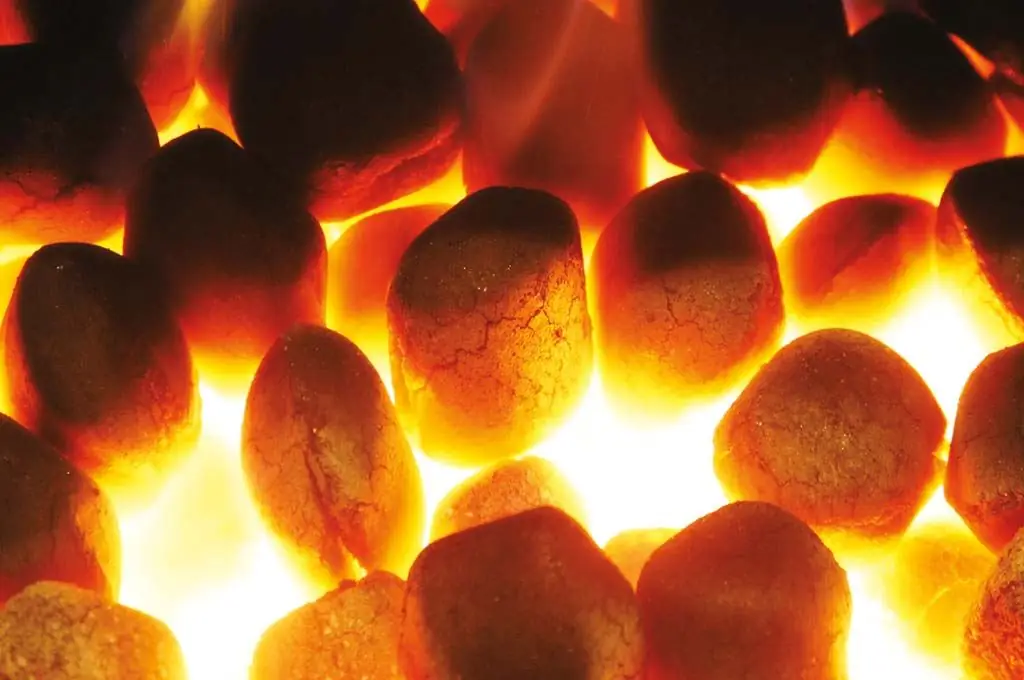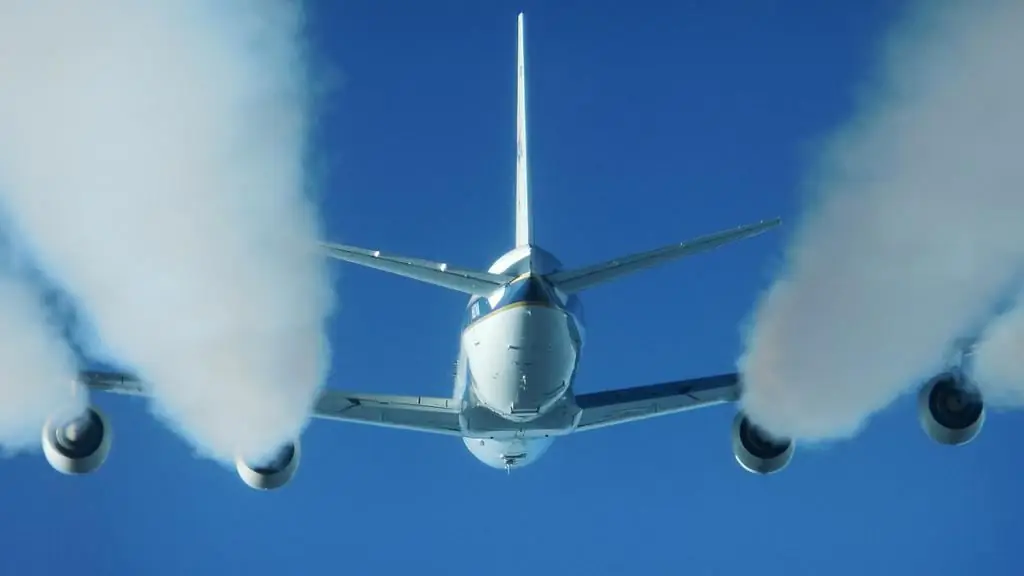2026 Author: Howard Calhoun | calhoun@techconfronts.com. Last modified: 2025-01-24 13:10:35
For heating residential buildings and industrial premises, as well as for supplying hot water to them, special installations - boilers are usually used. Equipment of this type can operate on different types of fuel. Moreover, the characteristics of the latter must comply with certain standards. Incorrect selection of fuel for the boiler room can lead to breakdown of water heating equipment. In this case, the efficiency of the boiler also decreases.
Fuel types
Installations designed for heating water can operate on:
- gas;
- liquid fuel;
- electricity;
- solid fuel.
Most often, gas or electric boilers are used for heating buildings and supplying hot water. Liquid plants are usually used only in remote areas - where there are no highways supplying "blue fuel". Wood, pellet and coal equipment is used where there is not even a power line.

The most popular type of fuel for a boiler house is gas. The installation of water heating equipment operating on it is quite expensive. Installing an electric boiler is at least much cheaper. However, significant costs during installation subsequently pay off due to the cheapness of gas. Electricity, as you know, is very expensive in our country.
Operation of solid fuel and liquid boilers is usually even cheaper than gas boilers. However, such equipment, unfortunately, is not very convenient to use. And the fuel itself in this case requires the creation of special storage conditions and often takes up a lot of space.
Gas for heaters
This type of fuel, as already mentioned, is used for boilers most often. According to the regulations, it is allowed to use any type of gas for heating installations - both liquefied and main. However, in the first case, boilers of an exclusively special design, designed to work in combination with cylinders or a gas tank, should be used to heat residential buildings and industrial premises.
Liquefied gas is usually used for heating only private houses. But sometimes this type of fuel for boiler houses is also used, for example, in general village communications.

Rules for the installation of boilers operating on "blue fuel"
Only licensed specialists are allowed to connect this type of equipment to the main or gas tank. For an independent tie-in, the owner of a country house or the head of an enterprise faces a serious fine. After allgas - fuel, as you know, explosive. And a wrong connection can easily lead to tragedy later on.
There are special requirements for the room in which the gas boiler itself will be located. Such equipment cannot be installed in rooms with a total volume of less than 7.5-15 m3, depending on the power. In this case, the room must be ventilated. The presence of blind windows in the room is not allowed. It is also impossible to install a gas boiler indoors if the total heat output of all appliances installed in it exceeds 150 kW.
Gas supply: regulations
Depending on the type of the nearby highway, the laying of pipes for the supply of "blue fuel" for boiler plants in the house can be carried out by the above-ground or underground method. In the first case, the following standards must be observed:
- gas pipeline elements should not come into contact with parts of buildings and structures made of combustible materials;
- pipe distortion is not allowed;
- vertical elements of the gas pipeline must be located strictly vertically;
- horizontal elements are laid at a slope of 2-5 mm towards the connected building.
When laying a line for supplying fuel to the boiler room underground, the following requirements must be met:
- pipes for transporting liquid gas are located below the level of soil freezing;
- when entering the building, the depth can decrease to 0.8-1.2 m;
- gas pipelines should be laid with a slope of at least 1.5mm per meter;
- pipes with liquid gas are laid under the foundation, with the usual - above it, through the wall;
- wells are provided for various kinds of detachable connections of the gas pipeline.

Liquid fuel oil requirements
Boilers used to heat residential buildings or industrial premises located in remote areas often run on diesel fuel. There are special requirements for diesel fuel for heating equipment. When choosing diesel fuel for a boiler, you should pay attention, first of all, to such characteristics as:
- cetane number;
- density and viscosity;
- fractional composition.
Cetane number determines such important indicators as:
- ignition time of fuel for boiler houses;
- completion of combustion of diesel fuel;
- emission level.
Ultimately, it is the cetane number of diesel fuel that affects the efficiency of water heating equipment. The optimal CN indicator for boilers is 40-45 units.

Storage requirements
Diesel oil, like gas, is a boiler fuel for boilers, dangerous in terms of fire and explosions. Therefore, it must be stored properly. In a private house, a separate room for diesel fuel is usually not required. However, if the volume of stored diesel fuel exceeds 5 thousand liters, it will still be necessary to build a warehouse for it.
You canstore diesel fuel if necessary, even in residential premises. However, its total volume should not exceed 40 liters.
In a room specially equipped for diesel fuel:
- it is impossible to carry out concealed installation of communications, pipelines and wires;
- signs should be posted prohibiting the use of open fire.
The room for diesel fuel itself must be built from non-combustible materials. Doors in this case are also used in a special design.
Enterprises located in remote areas, for example in the Far North, often purchase a special type of equipment - block-modular liquid fuel boilers. In such complexes, premises for storing diesel fuel may be provided initially.

The volume of diesel fuel necessary for the uninterrupted operation of the boiler depends, first of all, on the power of the latter. Fuel consumption for a boiler room (liquid) is calculated according to a rather simple scheme. For 10 kW of boiler power, usually 1 kg of diesel fuel per hour is required.
Coal for boilers
Solid fuel heating equipment is by far the most economical, but also the least convenient to use. Most often, such boilers, like furnaces, operate on coal. In this case, as well as when using diesel fuel, the choice of fuel should be approached carefully.
Responsible for the supply of solid fuel in the boiler room operator-fireman. The quality of the coal loaded by it depends primarily on the efficiency of the water heating system.equipment. The more responsibly the boiler house employees approach the choice of this type of solid fuel, the longer the installation will last.
Any coal consists of carbon and non-combustible impurities. The latter after combustion form ash and slag. The ratio between impurities and carbon determines the grade of coal. This indicator in different types of fuel can vary within rather large limits. For example, the carbon content in lingite is very low. Therefore, this type of fuel is never used for boilers.
Forms just a huge amount of ash and slag and brown coal. In principle, it can be used for boilers. However, this is highly discouraged.
Coal forms little ash, has a low percentage of moisture and has a fairly dense structure. Its calorific value is 5500 kcal/kg. The carbon content in it is 75%. It is this type of solid fuel for boilers that is best suited.

Firewood for water heaters
This type of fuel is rarely used to ensure the operation of boilers. But still, sometimes in private homes or even in enterprises you can see heating equipment that functions precisely on wood. The advantage of this type of fuel is, first of all, the relative cheapness. However, using the boiler when using firewood is usually very inconvenient. The operator of the boiler room should throw solid fuel of this type into the furnace 2-3 times a day. The same feature has the operation of a water heater.on firewood and in a private house.
There are, of course, no special requirements for logs when used for boilers. The only thing is that this type of fuel for boiler rooms must be dry enough. Firewood should be stored under a canopy or in a special small separate room - a firewood shed. Traditionally, for boilers, as well as for stoves, hardwood logs are used. Conifers, when burned, leave a lot of ash and soot due to resin. Birch wood is best suited for a solid fuel boiler.
Pellets
This type of fuel is commonly used in long burning boilers. Such equipment has a special design that ensures almost complete combustion of pellets, without even the formation of ash. Sometimes the stoker of a solid fuel boiler is responsible for supplying combustible pellets. But in some cases, automatic loading can be used in such installations. Such systems make the equipment much more convenient to use.
Also, modern, easy-to-use modular solid fuel boilers have become very popular recently. Using pellets for their work is also a near perfect solution.
Types of pellets
There are several types of such fuel on the modern market. Industrial pellets are gray-brown in color and have a high percentage of ash content. Such fuel is mainly suitable only for industrial boilers. Using it in domestic water heaters may damage them.

Agropellets are obtained from crop waste. The percentage of their ash content is also quite high. Such fuel is usually used only at large thermal power plants.
White pellets are made from debarked wood. The percentage of their ash content is only 0.5%. The color of such pellets is light yellow. They are quite expensive. However, it is white pellets that are commonly used in household solid fuel boilers.
Electric water heating equipment
The main advantage of such boilers, as already mentioned, is ease of installation. Yes, and this type of water heating equipment is much cheaper than gas or even solid fuel. Household electric boilers usually operate from a network with a voltage of 220 V. The latter should not “jump”. If voltage fluctuations are observed in the area where the boiler is used, or it is increased or decreased, additional stabilizers should be used.
Recommended:
Solid fuel is Types, characteristics and production of solid fuel

Non-fossil solid fuel based on wood and industrial waste - affordable and efficient fuel. The modern market offers a wide range of solid fuels, differing in efficiency and characteristics
Diesel fuel: GOST 305-82. Characteristics of diesel fuel according to GOST

GOST 305-82 is outdated and replaced, but the new document, which came into force at the beginning of 2015, did not change the requirements for diesel fuel for high-speed engines so noticeably. Maybe someday such fuel will be banned for use altogether, but today it is still used both in power plants and on diesel locomotives, heavy military equipment and trucks, the fleet of which has been preserved since the days of the Soviet Union due to its versatility and cheapness
Boiler fuel: types, characteristics

When choosing boiler fuel, you can look at heat pumps and solar energy. To date, this direction of alternative energy is the most promising and young. From the point of view of environmental protection, this solution will be the best choice, because solar energy has zero cost
Diesel fuel is Types, grades, brands, classes of diesel fuel

Diesel fuel, which until recently was used in various industries, is becoming more in demand, as more passenger cars are produced with diesel engines, and owners of private vehicles have to understand the characteristics of this fuel
Fuel consumption of an aircraft: types, characteristics, displacement, amount of fuel and refueling

Fuel consumption of an aircraft is one of the important indicators of the efficient operation of mechanisms. Each model consumes its own amount, tankers calculate this parameter so that the airliner is not loaded with excess weight. Various factors are considered before allowing a departure: flight range, availability of alternate airfields, weather conditions of the route

